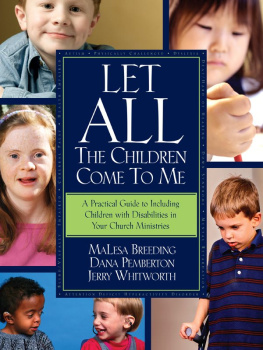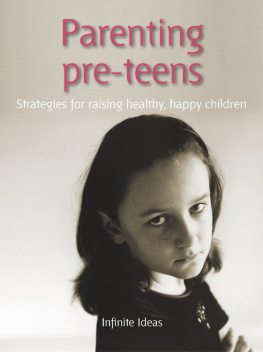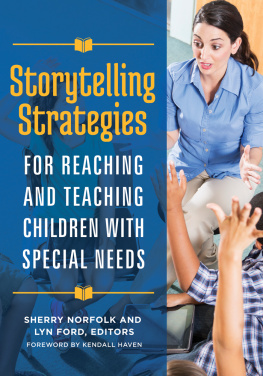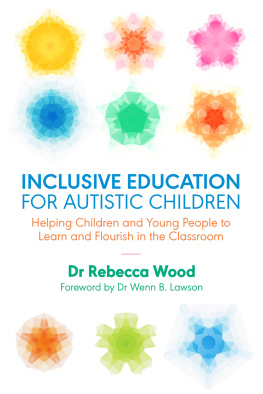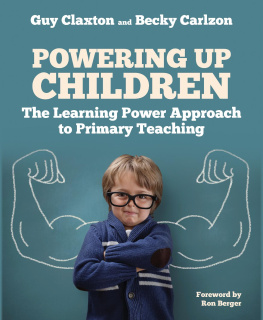
Table of Contents
This book grew out of conversations the three of us, MaLesa, Dana, and Jerry, had over the course of several months as we met occasionally for coffee and to share information about our lives, thoughts and views on a variety of topics. One topic that deeply interested all three of us was teaching children with disabilities the good news about Jesus.
It is a topic that is close to our hearts. MaLesa is a speech-language pathologist and Chair of Abilene Christian Universitys Department of Communication Disorders. She has worked in the public schools as a therapist with special needs students and is one of the founders and directors of King Davids Kids, a Bible class program for children with developmental disabilities.
Dana is an early childhood specialist and Director of Early Childhood and Elementary Programs for Abilene Christian Universitys Department of Education. She teaches Bible classes to children of all ages, including many with disabilities. Dana is also the author of a Bible School curriculum and presents workshops around the country on brain-based learning and the development of spirituality in children.
Jerry is a special educator and Chair of Abilene Christian Universitys Department of Education. He teaches classes on methods for teaching children with special needs, and has developed and coordinated several grant projects on the inclusion of children with disabilities in general classroom settings.
Although we started out with the concept of writing a book about teaching children with disabilities in Bible classes we began to see our mission as much broader than that. Teaching, in a way, carries the connotation of something that is one direction: the simple act of dispensing knowledge. We teach, children learn. As Christian educators we believe that what takes place in the Bible class is, or should be, much greater than that. It is a place where faith is acquired and strengthened, where relationships are formed and deepened while Gods grace and love is displayed, practiced, and shared. The Bible class is an experience, an opportunity, which benefits everyone who is blessed to be a part of it. The impact and power of that class extends far beyond the actual time we spend in a classroom.
We believe children who learn, look, act, and behave differently than the typical child should share just as fully in that opportunity. We hope that this book will be a resource and an inspiration to you as you attempt to help all of your students become a part of the Bible class experience.
MaLesa Breeding
Dana Kennamer Pemberton
Jerry Whitworth
What is the deal with this kid? This was often the response of Bible class teachers who encountered David (not his real name) for the first time. This particular Wednesday night class experience had been especially difficult. All of the children from kindergarten through fifth gradeabout 90 childrenwere in one special combined class that night. This was an overwhelming experience for David. He was over-stimulated and could not calm down.
By the end of the class time, his teacher was frustrated and angry. She could not imagine a child acting like David did. When she corrected him for his behavior he looked at her and told her she was mean. This was too much! Werent children supposed to be respectful at church? I told him that I would not accept that! she told me.
Well, I said. The first thing you need to know is that I love this kid. Then I explained to her that David had several challenges out of his control, including Tourettes syndrome and ADHD. Despite these challenges, David is an amazing kid. He knows Gods Word better than most of the children in the class. His talent in art is exceptional. Often, he is the first to ask that we recognize the special accomplishments of others. There is no child in that group of 90 children with a purer heart or a stronger desire to please God.
Despite all his gifts, Davids behavior continued to frustrate his teachers who did not know how to respond to his unusual behavior. All they could see was problemsnot promise. The only solution they can think of was to remove him from the class.
I went home that night and prayed for my little friend, David. As I thought about the response of this teacher and got past my own frustration over her negative reaction to him, I realized that she had not been equipped to respond to Davids needs. Her anger and frustration were normal responses when faced with the behavior he exhibited that night. I came to realize that this teacher didnt need my judgment, and by Gods grace I had not responded to her in a negative manner. She needed help.
The more I thought about that conversation, the more I realized that there are Davids in churches all over the world. They have Down syndrome, autism, dyslexia, and many other challenges. Teachers who volunteer in their churchs Bible classes are rarely trained to address the special needs of these children. Like Davids teacher, they need help.
That is when the dream for this book was born. I felt God was calling me to do something for these special children of His as well as the people who minister to them every week. This was a task I knew I could not accomplish on my own. Immediately I thought about my friends and colleagues, Jerry and MaLesa.
And so here we are: three professionals with different experiences and specializations, but with the same passion. We all have a heart for the child who doesnt fit in or just cant keep up. Praise God we serve a Savior with the same heart!
We pray that this book will help you see the children with challenges in your church with new eyes. Hopefully you will find both information and practical strategies to help you in your ministry to children. Finally, as you work with all the children that God has placed before you, may you never forget the value of what you do. You are welcoming the kingdom of God. What an awesome and humbling task!
As the Chair of the Department of Communication Disorders, I am responsible for providing students a variety of opportunities to work with different populations of people with communication disorders. When the mother of a child with autism asked me to help her start a support group for amilies of children with autism and other developmental disabilities, I saw a wonderful opportunity. My students would have the chance to work with clinical populations that arent available to other students. This was a business decisiona clinical decision, perhapsor so I thought. Looking back, the creation of King Davids Kids was a great decision. My students have learned more about autism and other developmental disorders by working with this group of children than they could have ever learned from reading textbooks. But the clinical skills and knowledge my students have gained take a back seat in comparison to the spiritual lessons they have learned.
King Davids Kids is a support ministry to families of children with developmental disabilities. While parents meet to provide support to one another, the students use Bible stories, songs, memory verses from Scripture, and prayers as vehicles for communication with the special needs children.
One of the first things I learned from working with this group is that parents of children with severe disabilities rarely go anywhere togetherby themselves, as a couple, or together as a family. Children with autism, for instance, scream (often for hours) if their routine is disrupted in any way. Parents dont go out to dinner together, they dare not go to the mall together and they often do not go to churchsimply because they cant find anyone who has the skills and willingness to spend more than a few minutes alone with their child. Twice a month the parents of King Davids Kids meet as a group to deal with their issues and to have an hour and a half together while we work with their children. In this way, we accomplish two goals: to teach the love and messages of Jesus to special needs children and to provide respite to their parents.

